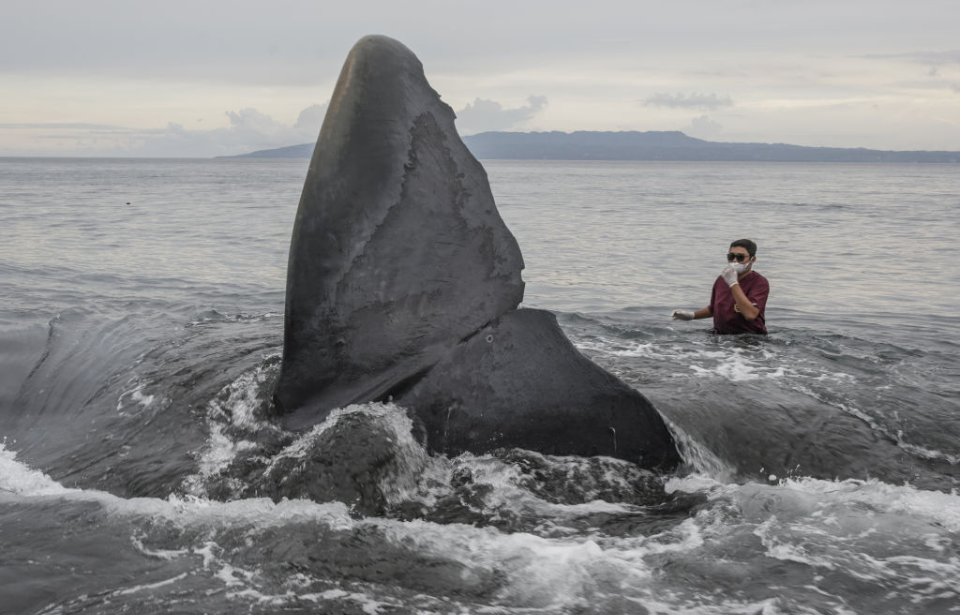Egyptian artifacts, ancient jewelry, legendary art – all of these are items we can assume would fetch a pretty penny. According to a recent find, however, we should also add whale vomit to that list. In 2023, a professor was investigating the body of a dead sperm whale when he came across this ‘treasure.’ The bodily fluid was valued at a staggering amount, truly making it ‘floating gold.’
The Canary Islands whale
The sperm whale in question washed up on La Palma, one of the Canary Islands, already dead. Rather than immediately remove the animal, Antonio Fernández Rodríguez, head of the Institute of Animal Health and Food Security at the University of Las Palma, wanted to perform a necropsy so that he could determine the cause of death. This was no easy task to do on a beach when the tide was constantly changing.
A sperm whale washed up on La Palma beach in the Canary Islands, concealing a hidden treasure; a piece of floating gold—ambergris. https://t.co/1T3f5N5BSw
— Getaway Magazine (@GetawayMagazine) July 6, 2023
His first suspicion was human involvement, but when that was ruled out, he moved on to investigate death from a digestive problem. When he reached a certain part of the intestine, he felt something hard, recounting, “What I took out was a stone about 50-60cm in diameter weighing 9.5kg. The waves were washing over the whale. Everyone was watching when I returned to the beach but they didn’t know that what I had in my hands was ambergris.” The substance is better known as whale vomit.
Ambergris
Ambergris is a rare and highly prized substance that is formed in the digestive systems of sperm whales, just like the one found in La Palma. This whale vomit is actually produced in response to irritation caused by indigestible squid beaks or other foreign objects that it can’t expel. Despite the name, it actually has a pleasant aroma that is often described as musky, earthy, and sweet. It’s one of the ingredients commonly used to make perfumes and other fragrances.
Pathologist finds €500,000 ‘floating gold’ in dead whale in Canary Islands https://t.co/8niAPc79IW
— The Guardian (@guardian) July 4, 2023
Is also used in traditional medicine and is believed to have various health benefits. It has been used to treat ailments such as headaches, epilepsy, and heart conditions. Ambergris is also extremely rare and highly sought after, so it is very expensive, earning its other nickname of ‘floating gold.’ What makes it even harder to come by is that scientists believe only one percent of sperm whales are actually able to secrete it, and their numbers are already diminishing.
A valuable find
As a result of strict regulations to protect the whales, ambergris is often discovered accidentally, as it was by Rodríguez. In this case, he believes it was also what ended up killing the animal. While whales are sometimes able to expel the substance by literally vomiting it up, other times, it grows too large and causes problems. It seems likely that sepsis caused by the ambergris killed this particular whale. Nonetheless, the team was determined to ensure that the creature didn’t die in vain.
What an incredible photograph. Gulliver would be proud. Academics inspecting a dead sperm whale in Las Palmas. An autopsy found a 9.5kg lump of Ambergris in its colon, worth £500,000
Photograph: Universidad de Las Palmas de Gran Canaria.
Source: Stuart White pic.twitter.com/m06M1cnhC7
— Johnno Maxwell (@MaxMaxWriter) July 4, 2023
Given the large size of the ambergris that they found, the estimated value was staggering – over $500,000 USD.
More from us: Valuable Treasures That Are Still Missing Today
They are currently looking for a buyer in the hopes that whatever they earn from the sale will be used to help those who suffered in the aftermath of the 2021 volcanic eruption on the island, which caused nearly $1 million USD in damage.
